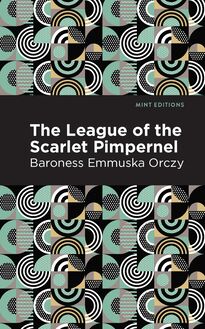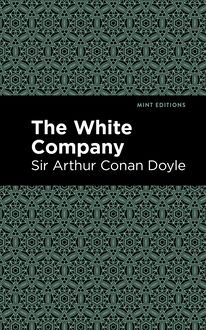-
 Univers
Univers
-
 Ebooks
Ebooks
-
 Livres audio
Livres audio
-
 Presse
Presse
-
 Podcasts
Podcasts
-
 BD
BD
-
 Documents
Documents
-
- Cours
- Révisions
- Ressources pédagogiques
- Sciences de l’éducation
- Manuels scolaires
- Langues
- Travaux de classe
- Annales de BEP
- Etudes supérieures
- Maternelle et primaire
- Fiches de lecture
- Orientation scolaire
- Méthodologie
- Corrigés de devoir
- Annales d’examens et concours
- Annales du bac
- Annales du brevet
- Rapports de stage
La lecture à portée de main
Vous pourrez modifier la taille du texte de cet ouvrage
Découvre YouScribe en t'inscrivant gratuitement
Je m'inscrisDécouvre YouScribe en t'inscrivant gratuitement
Je m'inscrisEn savoir plus
Vous pourrez modifier la taille du texte de cet ouvrage
En savoir plus

Description
“The White Companyis a lively romance, and very good reading for boys and friends of old times and tall knights.” -Andrew Lang
“Start a story by Conan Doyle and you cannot stop reading, whether you are ten or sixty.”-Michael Dirda
“The immense talent, passion and literary brilliance that Conan Doyle brought to his work gives him a unique place in English letters.”-Stephen Fry
Arthur Conan Doyle’s The White Company (1891) is a vivid and action-packed historical adventure novel set against the backdrop of the Hundred Years’ War in 14th century Western Europe. With Doyle’s impeccable eye for historical accuracy, this chivalric tale of a motley gang of Saxon knights en route to battle in France is a breathtaking window into the medieval world.
When Alleyne, a young Saxon noble-man who has been raised in a monastery comes of age, he is in accordance with his father’s will, instructed to experience the outside world. As Alleyne travels through England he meets two men in search of adventure; Hordle John and Samkin Aylward. They convince the young lad to join them on their journey to the castle of the enigmatic knight Sir Nigel Loring. When they arrive they learn that Sir Nigel had been chosen to lead the White Company, the English stalwart archers, into battle against the French. Under the banner of Sir Nigel, our valiant heroes fall into increasingly thrilling adventures, including a swashbuckling episode with pirates on the high seas, chivalric battles, and epic feats as the White Company strive in their unswerving appetite for glory in battle. With The White Company readers of all ages will fall under the spell of one of the most thrilling and accurate historical adventures ever penned.
With an eye-catching new cover, and professionally typeset manuscript, this edition of The White Company is both modern and readable.
Sujets
Informations
| Publié par | Mint Editions |
| Date de parution | 01 décembre 2020 |
| Nombre de lectures | 0 |
| EAN13 | 9781513272375 |
| Langue | English |
| Poids de l'ouvrage | 3 Mo |
Informations légales : prix de location à la page 0,0500€. Cette information est donnée uniquement à titre indicatif conformément à la législation en vigueur.
Extrait
The White Company
Sir Arthur Conan Doyle
The White Company was first published in 1891.
This edition published by Mint Editions 2020.
ISBN 9781513267371 | E-ISBN 9781513272375
Published by Mint Editions®
minteditionbooks.com
Publishing Director: Jennifer Newens
Design & Production: Rachel Lopez Metzger
Typesetting: Westchester Publishing Services
C ONTENTS
I. H OW THE B LACK S HEEP C AME F ORTH FROM THE F OLD
II. H OW A LLEYNE E DRICSON C AME O UT INTO THE W ORLD
III. H OW H ORDLE J OHN C OZENED THE F ULLER OF L YMINGTON
IV. H OW THE B AILIFF OF S OUTHAMPTON S LEW THE T WO M ASTERLESS M EN
V. H OW A S TRANGE C OMPANY G ATHERED AT THE “P IED M ERLIN ”
VI. H OW S AMKIN A YLWARD W AGERED HIS F EATHER - BED
VII. H OW THE T HREE C OMRADES J OURNEYED T HROUGH THE W OODLANDS
VIII. T HE T HREE F RIENDS
IX. H OW S TRANGE T HINGS B EFELL IN M INSTEAD W OOD
X. H OW H ORDLE J OHN F OUND A M AN WHOM HE M IGHT F OLLOW
XI. H OW A Y OUNG S HEPHERD H AD A P ERILOUS F LOCK
XII. H OW A LLEYNE L EARNED M ORE T HAN H E C OULD T EACH
XIII. H OW THE W HITE C OMPANY S ET F ORTH TO THE W ARS
XIV. H OW S IR N IGEL S OUGHT FOR A W AYSIDE V ENTURE
XV. H OW THE Y ELLOW C OG S AILED F ORTH F ROM L EPE
XVI. H OW THE Y ELLOW C OG F OUGHT THE T WO R OVER G ALLEYS
XVII. H OW THE Y ELLOW C OG C ROSSED THE B AR OF G IRONDE
XVIII. H OW S IR N IGEL L ORING P UT A P ATCH U PON H IS E YE
XIX. H OW T HERE W AS S TIR AT THE A BBEY OF S T . A NDREW ’ S
XX. H OW A LLEYNE W ON H IS P LACE IN AN H ONORABLE G UILD
XXI. H OW A GOSTINO P ISANO R ISKED H IS H EAD
XXII. H OW THE B OWMEN H ELD W ASSAIL AT THE “R OSE D E G UIENNE ”
XXIII. H OW E NGLAND H ELD THE L ISTS AT B ORDEAUX
XXIV. H OW A C HAMPION C AME F ORTH F ROM THE E AST
XXV. H OW S IR N IGEL W ROTE TO T WYNHAM C ASTLE
XXVI. H OW THE T HREE C OMRADES G AINED A M IGHTY T REASURE
XXVII. H OW R OGER C LUB - FOOT W AS P ASSED I NTO P ARADISE
XVIII. H OW THE C OMRADES C AME O VER THE M ARCHES OF F RANCE
XXIX. H OW THE B LESSED H OUR OF S IGHT C AME TO THE L ADY T IPHAINE
XXX. H OW THE B RUSHWOOD M EN C AME TO THE C HATEAU OF V ILLEFRANCHE
XXXI. H OW F IVE M EN H ELD THE K EEP OF V ILLEFRANCHE
XXXII. H OW THE C OMPANY T OOK C OUNSEL R OUND THE F ALLEN T REE
XXXIII. H OW THE A RMY M ADE THE P ASSAGE OF R ONCESVALLES
XXXIV. H OW THE C OMPANY M ADE S PORT IN THE V ALE OF P AMPELUNA
XXXV. H OW S IR N IGEL H AWKED AT AN E AGLE
XXXVI. H OW S IR N IGEL T OOK THE P ATCH F ROM H IS E YE
XXXVII. H OW THE W HITE C OMPANY C AME TO B E D ISBANDED
XXXVIII. O F THE H OME - COMING TO H AMPSHIRE
I
H OW THE B LACK S HEEP C AME F ORTH FROM THE F OLD
T he great bell of Beaulieu was ringing. Far away through the forest might be heard its musical clangor and swell. Peat-cutters on Blackdown and fishers upon the Exe heard the distant throbbing rising and falling upon the sultry summer air. It was a common sound in those parts—as common as the chatter of the jays and the booming of the bittern. Yet the fishers and the peasants raised their heads and looked questions at each other, for the angelus had already gone and vespers was still far off. Why should the great bell of Beaulieu toll when the shadows were neither short nor long?
All round the Abbey the monks were trooping in. Under the long green-paved avenues of gnarled oaks and of lichened beeches the white-robed brothers gathered to the sound. From the vine-yard and the vine-press, from the bouvary or ox-farm, from the marl-pits and salterns, even from the distant iron-works of Sowley and the outlying grange of St. Leonard’s, they had all turned their steps homewards. It had been no sudden call. A swift messenger had the night before sped round to the outlying dependencies of the Abbey, and had left the summons for every monk to be back in the cloisters by the third hour after noontide. So urgent a message had not been issued within the memory of old lay-brother Athanasius, who had cleaned the Abbey knocker since the year after the Battle of Bannockburn.
A stranger who knew nothing either of the Abbey or of its immense resources might have gathered from the appearance of the brothers some conception of the varied duties which they were called upon to perform, and of the busy, wide-spread life which centred in the old monastery. As they swept gravely in by twos and by threes, with bended heads and muttering lips there were few who did not bear upon them some signs of their daily toil. Here were two with wrists and sleeves all spotted with the ruddy grape juice. There again was a bearded brother with a broad-headed axe and a bundle of faggots upon his shoulders, while beside him walked another with the shears under his arm and the white wool still clinging to his whiter gown. A long, straggling troop bore spades and mattocks while the two rearmost of all staggered along under a huge basket o’ fresh-caught carp, for the morrow was Friday, and there were fifty platters to be filled and as many sturdy trenchermen behind them. Of all the throng there was scarce one who was not labor-stained and weary, for Abbot Berghersh was a hard man to himself and to others.
Meanwhile, in the broad and lofty chamber set apart for occasions of import, the Abbot himself was pacing impatiently backwards and forwards, with his long white nervous hands clasped in front of him. His thin, thought-worn features and sunken, haggard cheeks bespoke one who had indeed beaten down that inner foe whom every man must face, but had none the less suffered sorely in the contest. In crushing his passions he had well-nigh crushed himself. Yet, frail as was his person there gleamed out ever and anon from under his drooping brows a flash of fierce energy, which recalled to men’s minds that he came of a fighting stock, and that even now his twin-brother, Sir Bartholomew Berghersh, was one of the most famous of those stern warriors who had planted the Cross of St. George before the gates of Paris. With lips compressed and clouded brow, he strode up and down the oaken floor, the very genius and impersonation of asceticism, while the great bell still thundered and clanged above his head. At last the uproar died away in three last, measured throbs, and ere their echo had ceased the Abbot struck a small gong which summoned a lay-brother to his presence.
“Have the brethren come?” he asked, in the Anglo-French dialect used in religious houses.
“They are here,” the other answered, with his eyes cast down and his hands crossed upon his chest.
“All?”
“Two and thirty of the seniors and fifteen of the novices, most holy father. Brother Mark of the Spicarium is sore smitten with a fever and could not come. He said that—”
“It boots not what he said. Fever or no, he should have come at my call. His spirit must be chastened, as must that of many more in this Abbey. You yourself, brother Francis, have twice raised your voice, so it hath come to my ears, when the reader in the refectory hath been dealing with the lives of God’s most blessed saints. What hast thou to say?”
The lay-brother stood meek and silent, with his arms still crossed in front of him.
“One thousand Aves and as many Credos, said standing with arms outstretched before the shrine of the Virgin, may help thee to remember that the Creator hath given us two ears and but one mouth, as a token that there is twice the work for the one as for the other. Where is the master of the novices?”
“He is without, most holy father.”
“Send him hither.”
The sandalled feet clattered over the wooden floor, and the iron-bound door creaked upon its hinges. In a few moments it opened again to admit a short square monk with a heavy, composed face and an authoritative manner.
“You have sent for me, holy father?”
“Yes, brother Jerome, I wish that this matter be disposed of with as little scandal as may be, and yet it is needful that the example should be a public one.” The Abbot spoke in Latin now, as a language which was more fitted by its age and solemnity to convey the thoughts of two high dignitaries of the order.
“It would, perchance, be best that the novices be not admitted,” suggested the master. “This mention of a woman may turn their minds from their pious meditations to worldly and evil thoughts.”
“Woman! woman!” groaned the Abbot. “Well has the holy Chrysostom termed them radix malorum . From Eve downwards, what good hath come from any of them? Who brings the plaint?”
“It is brother Ambrose.”
“A holy and devout young man.”
“A light and a pattern to every novice.”
“Let the matter be brought to an issue then according to our old-time monastic habit. Bid the chancellor and the sub-chancellor lead in the brothers according to age, together with brother John, the accused, and brother Ambrose, the accuser.”
“And the novices?”
“Let them bide in the north alley of the cloisters. Stay! Bid the sub-chancellor send out to them Thomas the lector to read unto them from the ‘Gesta beati Benedicti.’ It may save them from foolish and pernicious babbling.”
The Abbot was left to himself once more, and bent his thin gray face over his illuminated breviary. So he remained while the senior monks filed slowly and sedately into the chamber seating themselves upon the long oaken benches which lined the wall on either side. At the further end, in two high chairs as large as that of the Abbot, though hardly as elaborately carved, sat the master of the novices and the chancellor, the latter a broad and portly priest, with dark mirthful eyes and a thick outgrowth of crisp black hair all round his tonsured head. Between them stood a lean, white-faced brother who appeared to be ill at ease, shifting his feet from side to side and tapping his chin nervously with the long parchment roll which he held in his hand. The Abbot, from his point of vantage, looked down on the two long lines of faces, placid and sun-browned for the most part, with the large bovine eyes and unlined features
-
 Univers
Univers
-
 Ebooks
Ebooks
-
 Livres audio
Livres audio
-
 Presse
Presse
-
 Podcasts
Podcasts
-
 BD
BD
-
 Documents
Documents
-
Jeunesse
-
Littérature
-
Ressources professionnelles
-
Santé et bien-être
-
Savoirs
-
Education
-
Loisirs et hobbies
-
Art, musique et cinéma
-
Actualité et débat de société
-
Jeunesse
-
Littérature
-
Ressources professionnelles
-
Santé et bien-être
-
Savoirs
-
Education
-
Loisirs et hobbies
-
Art, musique et cinéma
-
Actualité et débat de société
-
Actualités
-
Lifestyle
-
Presse jeunesse
-
Presse professionnelle
-
Pratique
-
Presse sportive
-
Presse internationale
-
Culture & Médias
-
Action et Aventures
-
Science-fiction et Fantasy
-
Société
-
Jeunesse
-
Littérature
-
Ressources professionnelles
-
Santé et bien-être
-
Savoirs
-
Education
-
Loisirs et hobbies
-
Art, musique et cinéma
-
Actualité et débat de société
- Cours
- Révisions
- Ressources pédagogiques
- Sciences de l’éducation
- Manuels scolaires
- Langues
- Travaux de classe
- Annales de BEP
- Etudes supérieures
- Maternelle et primaire
- Fiches de lecture
- Orientation scolaire
- Méthodologie
- Corrigés de devoir
- Annales d’examens et concours
- Annales du bac
- Annales du brevet
- Rapports de stage




















